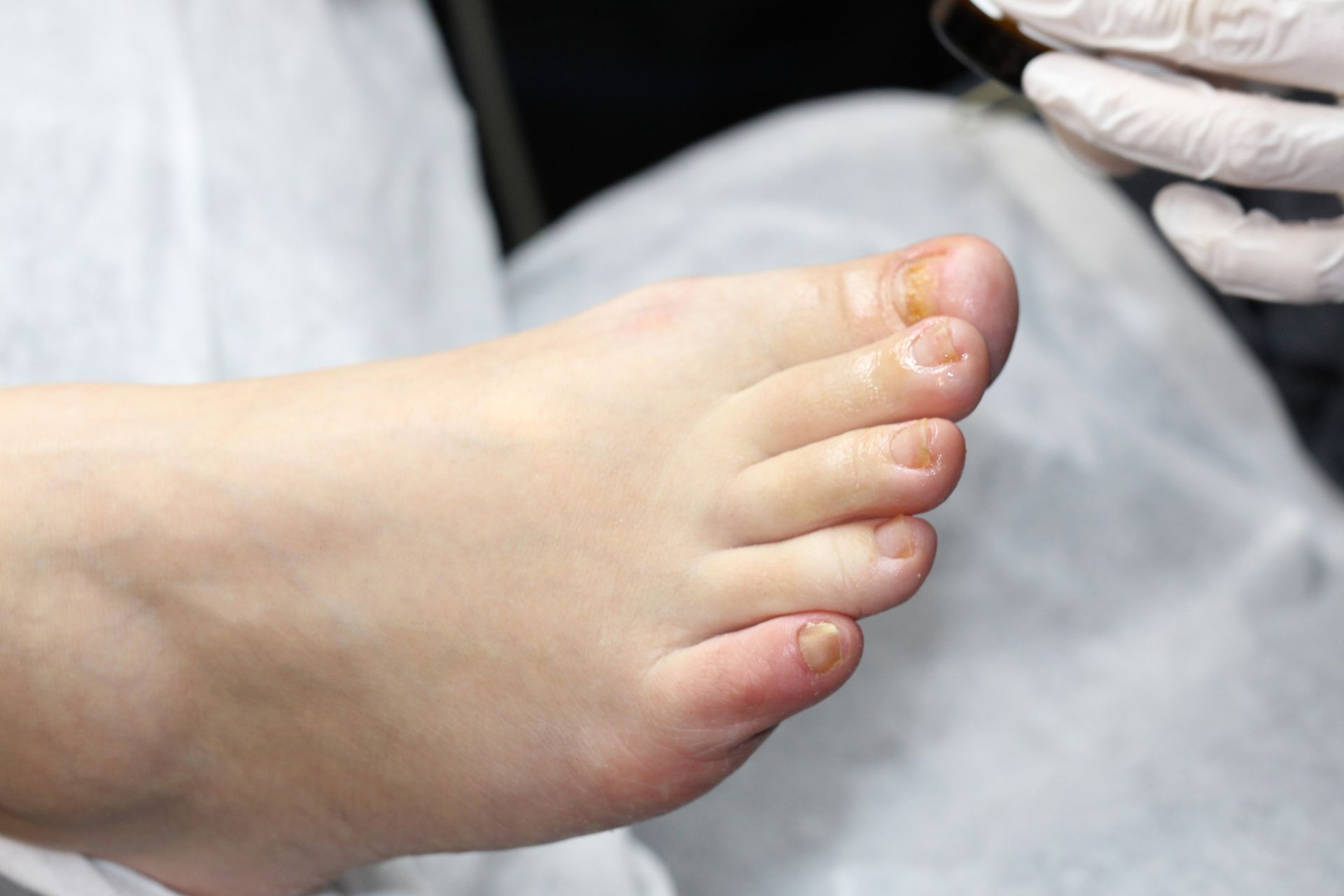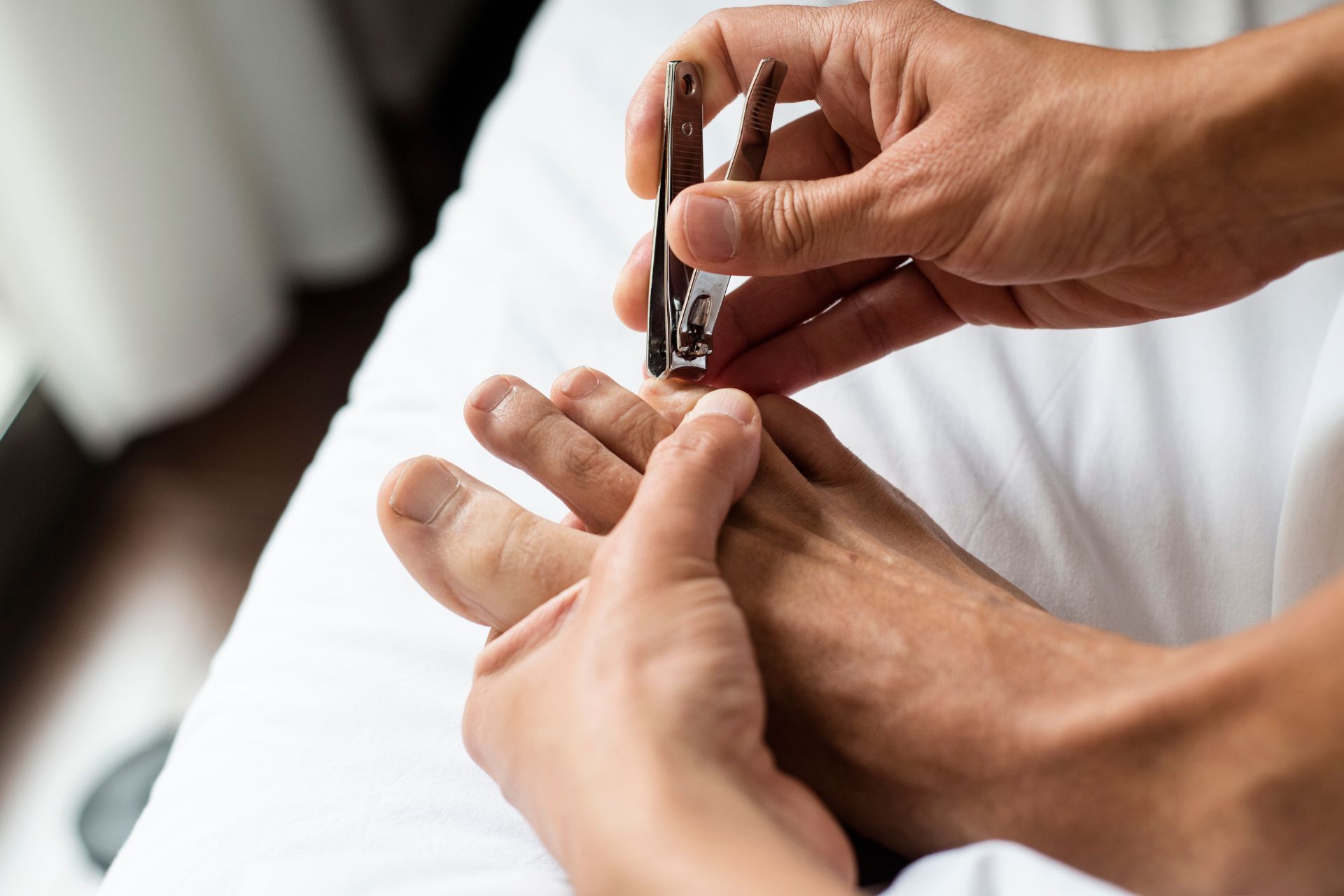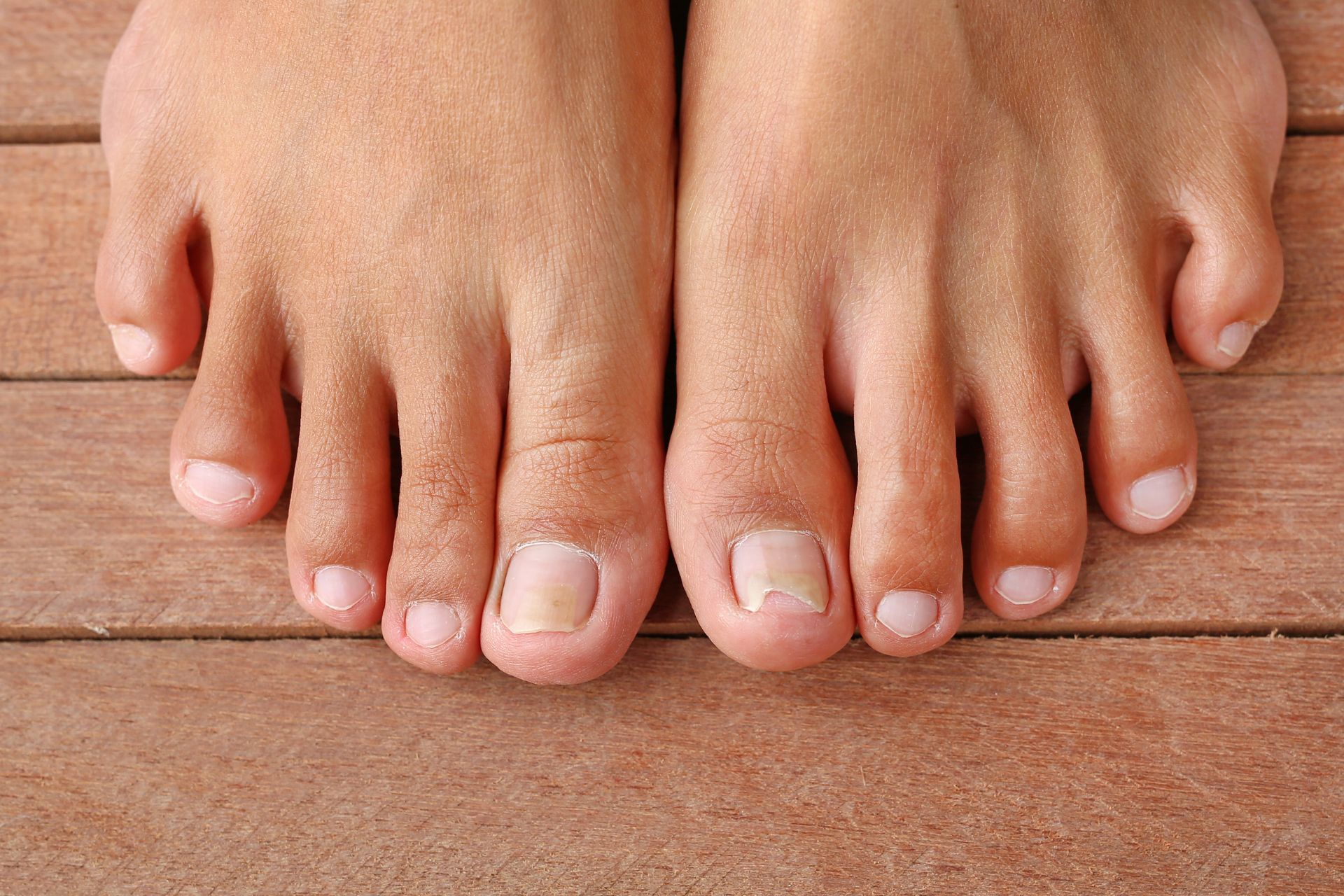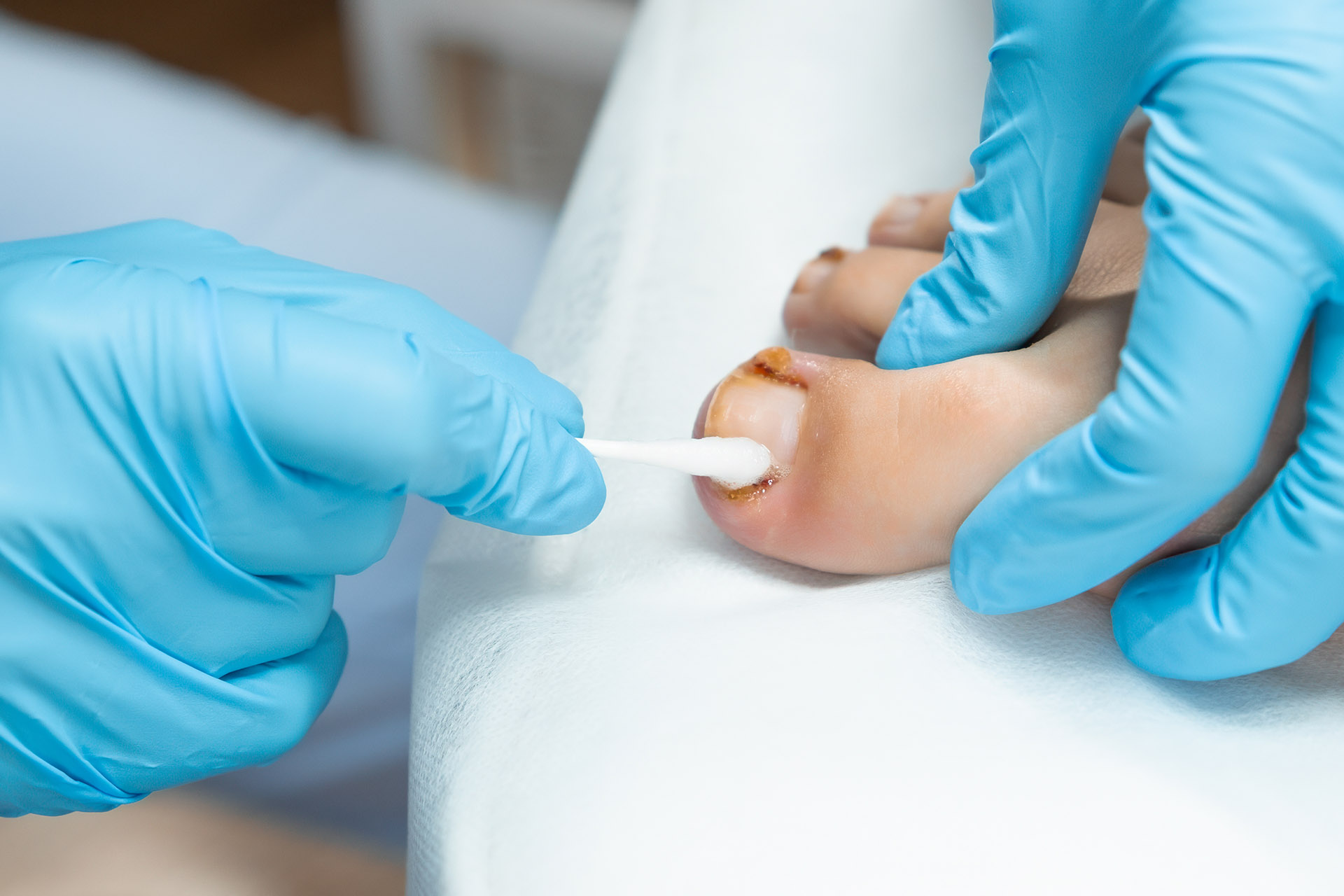It’s not the most pleasant of subjects, but it is a reality: thick toenails can affect anyone at any time. While it may sound like an aesthetic issue, thick toenails, or its medical term, onychauxis, is a serious problem beyond a cosmetic concern. We will go through some causes of thick nails on your foot, home remedies for thick toenails, and how a podiatrist can help with your nail health.
What’s Causing The Problem? Understanding Thick Toenails
There are diverse causes for thick toenails, and each condition requires a different type of treatment. The most common of the bunch may sound silly, but it’s as simple as a stubbed toe. In this case, a stubbed toe is a stand-in for many types of trauma, including dropping a heavy object on the nail. The toe becomes thick in these cases because the nail root may be damaged.
Another common cause of thick toenails is fungal infections. This can make the nail thick, brittle, and discoloured. For some, it can make the end of the nail look “frayed” or yellowed. This is an extremely common condition often overlooked by people who believe it is only an aesthetic issue.

One group of people who tend to develop thick toenails is runners. This is because they’re both exposed to higher levels of fungus than ordinary people, as their feet are encased in socks and shoes that can trap humidity and stimulate bacterial growth. On top of that, it can also be due to consistent pressure placed on the foot, causing the toenail to thicken in order to resist the ill-fitting sock or shoe.
Ageing is another factor; as we age, toenails naturally thicken and become more susceptible to fungal infections. Poor circulation, often associated with diabetes or peripheral artery disease, can lead to thicker toenails due to inadequate blood flow to the nail bed.
Psoriasis, a skin condition, can also affect toenails, causing them to become thick, pitted, and discoloured.
Other medical conditions, such as thyroid disorders, can influence nail growth and thickness. Sometimes, thick toenails are hereditary, passed down through generations. Regardless of the cause, a thick toenail is nothing to ignore, especially when things can be done to ease your discomfort.
Managing Thick Toenails: At Home and With A Podiatrist
As with any condition, prevention is preferred to intervention. Some options may seem common sense, but it’s better to be safe than sorry with foot health. Here are some options for preventing thick toenails:
- Maintain Good Foot Hygiene: Wash your feet daily with soap and water, and dry them thoroughly, especially between the toes. Keeping your feet clean and dry helps prevent fungal infections.
- Trim Nails Properly: To prevent ingrown nails, cut your toenails straight across and avoid rounding the corners. Use clean, sharp nail clippers and avoid cutting them too short.
- Wear Appropriate Footwear: Choose shoes that fit well and provide enough room for your toes. Tight or ill-fitting shoes can traumatise the toenails, leading to thickening.
- Change Socks Regularly: Wear clean, dry socks and change them daily. Moisture-wicking socks can help keep your feet dry and reduce the risk of fungal infections.
- Protect Your Feet: Wear protective footwear in public places like gyms, swimming pools, and locker rooms to prevent fungal infections.

If you realise you have thick toenails and would like to address the situation, make an appointment at The Foot Practice. Our podiatrists can offer a range of intervention strategies and provide you with the appropriate type of home care for your condition.
Using any thick toenail home remedy you find online may not be helpful if it does not address the root of the problem; you don’t want to make the problem worse accidentally. Here are some of the strategies they may suggest:
- Soak in Warm Water and Epsom Salt: Soaking your feet in warm water with Epsom salt can soften thick toenails, making them easier to trim and reducing discomfort. Soak for 15-20 minutes, then dry thoroughly.
- Apply Tea Tree Oil: Tea tree oil has antifungal properties that can help treat fungal infections. Apply a few drops of tea tree oil to the affected toenail daily.
- Use Vinegar Soaks: Soaking your feet in one part vinegar and two parts water can help combat fungal infections. Soak for 15-20 minutes daily, then thoroughly dry your feet.
- Keep Nails Moisturized: Applying a moisturising cream or lotion to your nails and cuticles can help prevent cracking and keep nails flexible.
- Avoid Nail Polish: While covering up thick toenails with polish might be tempting, it can trap moisture and exacerbate fungal infections. Give your nails time to breathe and heal.

If all of these strategies are available, what can a podiatrist do for thick toenails? The answer is a lot.
These strategies will only be effective if the underlying cause of your thick toenails is addressed. That’s why a podiatrist starts with a thorough examination of your foot. Whether it’s a fungal infection, trauma, poor circulation, or a systemic health condition, pinpointing the cause is crucial for effective treatment.
Following their diagnosis, podiatrists provide appropriate care for thick toenails. For fungal infections, podiatrists can prescribe antifungal medications, either topical or oral, which are more potent than over-the-counter options. If thick toenails result from trauma or improper nail growth, they can be trimmed and thinned using specialised tools, providing immediate relief from discomfort.
Beyond that, the podiatrist will also offer specific preventive care advice relevant to the cause of your condition.
They will offer tips like proper nail trimming techniques and foot hygiene practices to prevent recurrence. Suppose they believe the issue is your footwear. In that case, they can recommend and fit orthotic devices or custom footwear to reduce pressure on the toenails, particularly for patients with diabetes or circulation issues. These are reasons why a podiatrist is a necessary part of your foot care regimen, as they will be able to assess your thick toenails and give you the support you need.
If you have thick toenails and want to change them, call or WhatsApp The Foot Practice at +65 8776 9918 today to make an appointment for the best foot health.






